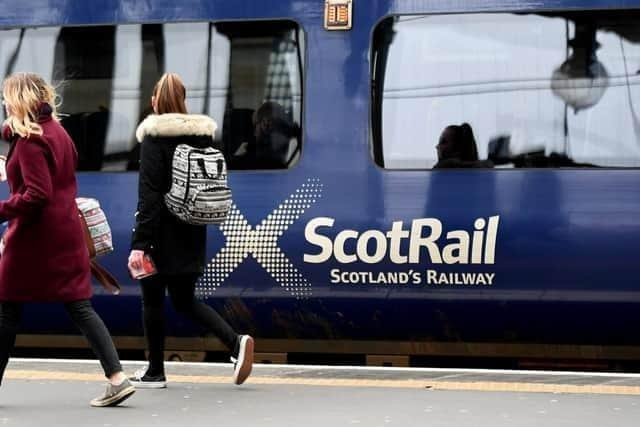ScotRail peak fares suspension: Passengers warned of 'much busier' trains as every available carriage pressed into service from Monday
ScotRail passengers are warned that some trains are expected to be "much busier than usual" when peak fares are suspended from Monday as the operator presses into service "all available carriages" to cope with likely demand.
It told The Scotsman it is forecasting a 10 per cent increase in passengers, although this is uncertain because the experiment has never been tried before.
Advertisement
Hide AdAdvertisement
Hide AdAll trains on the main line between Edinburgh and Glasgow will operate with seven or eight carriages compared to four currently on some services.


Six extra trains, each with 210 seats, will also be deployed to provide more capacity on the cross-city Argyle and north Clyde lines in Glasgow. The latter extends via Bathgate to Edinburgh.
These will help return ScotRail’s overall peak hour seat capacity to 98 per cent of pre-pandemic levels.
However, Transport Scotland said ScotRail’s ability to deploy more trains or switch them between different routes was “limited”.
The operator confirmed it had no spare carriages to add extra seats on diesel-hauled routes, which cover much of the country outside the Central Belt.
It advised passengers planning to travel during peak periods to plan ahead by checking regular updates “on the busiest services and alternative options, where available”.
The trial, which lasts until March 31, will see greater fare reductions on some routes as the difference between peak and off-peak fares varies.
Edinburgh-Glasgow peak day returns come down from £28.90 to £14.90, Inverkeithing in Fife to Edinburgh from £11.10 to £6.50 and Stirling-Glasgow from £16.10 to £9.60.
Advertisement
Hide AdAdvertisement
Hide AdTransport Scotland, which oversees the nationalised firm, said it had a “range of possible forecasts” for the impact of the six-month pilot but they were “subject to significant uncertainty”.
It comes as The Scotsman understands there is some excitement within the rail industry about the prospects of the experiment being successful after we revealed that rail chiefs had warned that it could cost more than twice the £15 million allocated by ministers if more people are not attracted to travel by train.
However, ScotRail said it expected the trial to cost less than £15m.
Industry sources have said the risk of overcrowding was likely to be highest in the afternoon peak when trains on some routes are busy with both shoppers and commuters.
ScotRail has published full details of the trial on its website.
The plans, announced in December by the then Deputy First Minister John Swinney, will see fares effectively halved on those routes where higher prices are charged in the former morning and late afternoon “rush hour” periods. Some lines do not have peak fares so passengers will see no change.
Transport Scotland said a key benefit would be to gain insight into the “current sensitivity of rail demand to prices”.
Mr Swinney told MSPs the trial was to make rail “affordable and attractive to travellers”. The announcement as part of the Scottish Budget followed ScotRail trailing other British train operators in recovering from Covid travel restrictions and major shifts in commuting patterns.
Advertisement
Hide AdAdvertisement
Hide AdAlex Hynes, managing director of Scotland’s Railway, which comprises ScotRail and track and signalling body Network Rail Scotland, has warned of the likely permanent impact of the fall in commuting. He said the reduction had been greater than south of the Border because of the higher take-up of hybrid and flexible working in Scotland.
He told The Scotsman in April the trial was “the biggest change to pricing in a generation” but it was “unlikely” that passengers would be unable to get a seat.
A report in March by David Lowrie, chief executive of ScotRail parent body Scottish Rail Holdings, released following a freedom of information request, stated: “The cost of the trial could be significantly more expensive than politically expected. The difference between peak and off-peak average yields for the peak journey volumes is equivalent to more than £60m per annum.”
Comments
Want to join the conversation? Please or to comment on this article.